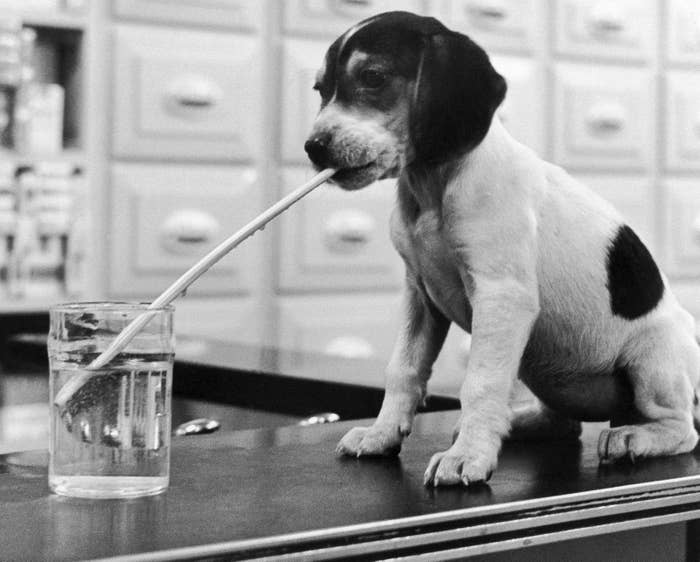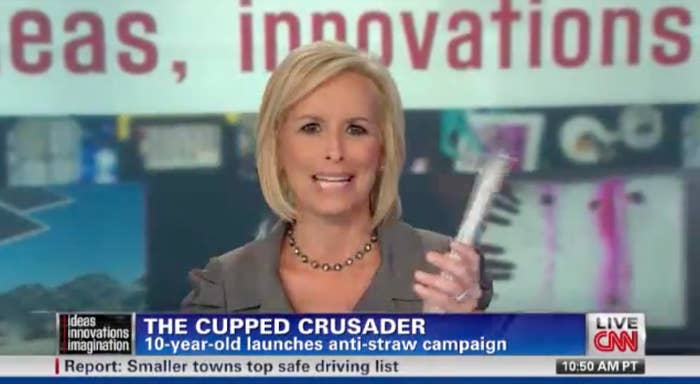
One sure path to success is to present your ideas as the musings of an innocent child. If you were to say "War is obviously bad," nobody would care. But "my 8-year-old son, Amaranth, sees the world so clearly — at breakfast today he told me war is obviously bad" is a recipe for 10,000 retweets, minimum.
This most recent incarnation of this — of turning pabulum into wisdom by placing it in the mouth of a 10-year-old — has suddenly jumped from social media into the real world of meddlesome left-wing policies. Thanks in part to the wisdom of a child, bans on plastic straws are currently going viral among left-leaning cities and the big businesses that depend on their good graces.
The straw ban began as the thought experiment of a real-life 10-year-old who called up a few straw manufacturers, asked them for their sales numbers, and extrapolated that Americans use 500 million straws per day. How exactly did he calculate this number? Math! Do manufacturers ever misstate their product sales when a random child calls? Shush, there’s an adorable kid on CNN!

The 500 million straws per day "statistic" — accelerated by a 10-year-old spokeschild like so many viral tweets before it — has stuck in the zeitgeist, gradually bringing about a negative sentiment toward plastic straws. You might think that much like a trending tweet, this trend would pass quickly. You would be wrong.
Keenly aware of the transient qualities of any viral meme, left-wing groups have pounced, seizing the opportunity to swiftly implement environmental policies. "Strike while the iron is hot" is out, "legislate while the meme is viral" is in. No further deliberation is needed because the viral campaign is the public comment period. And just like that, a new policy to pull straws out of our mouths is shoved down our throats.
While much can be said of the insipid straw ban — not least of which is that if people collectively choose to use 500 million of them every day, then straws surely provide some utility or at least joy — it is specifically the straw ban’s willfully insidious methods of misinformation that must be called out and resisted. Even if the straw ban doesn’t affect you, even if you’re getting all your fluids intravenously, this is a dry run of a new technique to introduce more meddlesome policies of greater consequence.
And be assured, there will be more bans.
Prohibiting plastic straws was always meant as a symbolic first step, with the intent of enacting future follow-up policies that might actually, well, help the environment. Take it from Dune Ives, who has a PhD in psychology and is the executive director of the organization behind the prominent #StopSucking campaign. Much like a classic James Bond villain, she proudly boasted of her brilliant scheme just as it appears to be coming to fruition:
Our team explored the myriad options of plastic pollution to find the perfect entry point to incent behavior change, we found plastic water bottles too endemic, plastic bags already somewhat politicized, and no viable alternative for the plastic cup in ALL markets. That’s why we chose the plastic straw. To us, it was the "gateway plastic" to the larger, more serious plastic pollution conversation. Plus, plastic straws are social tools and props, the perfect conversation starter.
It sure sounds like straws were settled on as the first step of last resort, and according to their expert in psychology, these 8-inch white "tools" (ahem) also make for a good marketing "prop" for a conversation focused on sucking.
Ives’ article, tellingly titled "The Gateway Plastic," concludes by celebrating her organization’s many intrusive achievements, including having "nudged an entire city to forever forego single-use plastic straws and cutlery. We hope we can nudge you to #stopsucking too."
It’s important to emphasize that these performatively draconian straw laws — punishable in San Francisco by a $250 fine — are not meant to directly address a public issue in the ways a seatbelt mandate or smoking bans do. Rather, the ban is meant merely to lay the groundwork, using more of a steamroller than a nudge, to make people more amenable to future supposedly pro-environment regulations.
Is this approach to social and psychological engineering ethical and humane? Did Ives consult a review board before enrolling multiple cities in a longitudinal psychological experiment?
The straw ban has captured the public imagination in part because it initially comes across as a cute trifle or a low-stakes cultural distraction. But like Donald Trump's presidential run, just because something seems like a joke to many does not mean it won't eventually have profound consequences. False statistics have been pumped into public consciousness through cute kids who are presented as above reproach. As a confused public has a diffuse sense that something is wrong and something should be done about it, legislatures hurriedly ram through policies to gain a foothold.
The architects of the #StopSucking campaign, who have stated their ulterior motives in hyping a problem only to offer a solution that sends us down their preferred legislative path, see the straw-using hoi polloi as literal suckers. As they’re now testing the fences using this new propaganda technique — an intrusive and impotent straw ban today with promises of follow-up bans tomorrow — it’s time to stop being pliant and start issuing warnings: You can have my straw when you pry it from my cold, dead mouth.
Adam Jayne is a cognitive science researcher living in New York.
